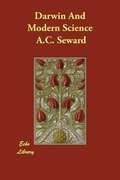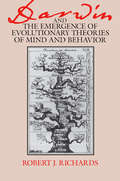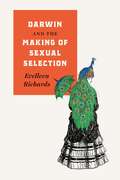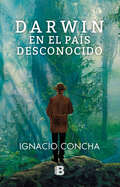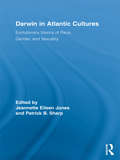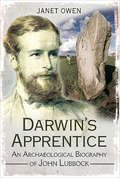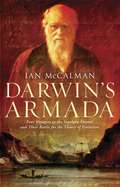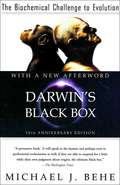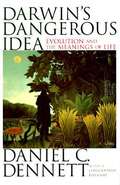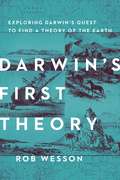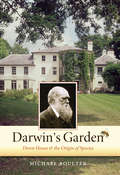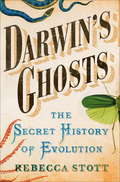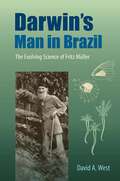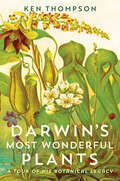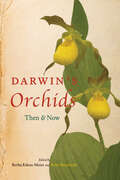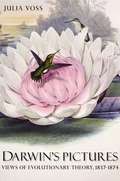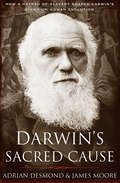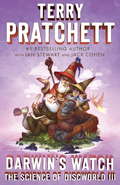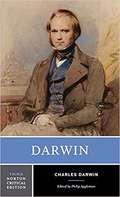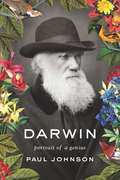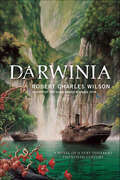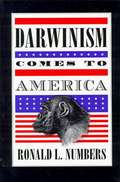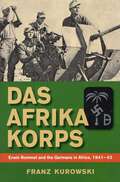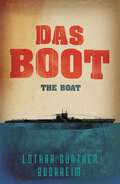- Table View
- List View
Darwin and Modern Science
by A. C. SewardThe Cambridge Philosophical Society collected this series of essays in commemoration of the centenary of the birth of Charles Darwin and the 50th anniversary of the publication of The Origin of Species. Aiming to be accessible to the 'educated layman', the eminent contributors reviewed the impact of Darwin's ideas in many spheres. They addressed contemporary (1909) attitudes, Darwin's theories and their far-reaching implications, and the progress of new lines of research that had emerged from them. The diversity of views among biologists regarding both the origin of species and the best directions for further research is clearly evident. In his work, Darwin had sought only the truth, writing 'Absolute accuracy is the hardest merit to attain, and the highest merit. Any deviation is ruin.' However dramatic the controversies he stirred, what shines from these essays is profound admiration for both Darwin's intellect and the quality of his character.
Darwin and the Emergence of Evolutionary Theories of Mind and Behavior (Science And Its Conceptual Foundations Ser.)
by Robert J. RichardsWith insight and wit, Robert J. Richards focuses on the development of evolutionary theories of mind and behavior from their first distinct appearance in the eighteenth century to their controversial state today. Particularly important in the nineteenth century were Charles Darwin's ideas about instinct, reason, and morality, which Richards considers against the background of Darwin's personality, training, scientific and cultural concerns, and intellectual community. Many critics have argued that the Darwinian revolution stripped nature of moral purpose and ethically neutered the human animal. Richards contends, however, that Darwin, Herbert Spencer, and their disciples attempted to reanimate moral life, believing that the evolutionary process gave heart to unselfish, altruistic behavior. "Richards's book is now the obvious introduction to the history of ideas about mind and behavior in the nineteenth century."—Mark Ridley, Times Literary Supplement "Not since the publication of Michael Ghiselin's The Triumph of the Darwinian Method has there been such an ambitious, challenging, and methodologically self-conscious interpretation of the rise and development and evolutionary theories and Darwin's role therein."—John C. Greene, Science "His book . . . triumphantly achieves the goal of all great scholarship: it not only informs us, but shows us why becoming thus informed is essential to understanding our own issues and projects."—Daniel C. Dennett, Philosophy of Science
Darwin and the Making of Sexual Selection
by Evelleen RichardsDarwin’s concept of natural selection has been exhaustively studied, but his secondary evolutionary principle of sexual selection remains largely unexplored and misunderstood. Yet sexual selection was of great strategic importance to Darwin because it explained things that natural selection could not and offered a naturalistic, as opposed to divine, account of beauty and its perception. Only now, with Darwin and the Making of Sexual Selection, do we have a comprehensive and meticulously researched account of Darwin’s path to its formulation—one that shows the man, rather than the myth, and examines both the social and intellectual roots of Darwin’s theory. Drawing on the minutiae of his unpublished notes, annotations in his personal library, and his extensive correspondence, Evelleen Richards offers a richly detailed, multilayered history. Her fine-grained analysis comprehends the extraordinarily wide range of Darwin’s sources and disentangles the complexity of theory, practice, and analogy that went into the making of sexual selection. Richards deftly explores the narrative strands of this history and vividly brings to life the chief characters involved. A true milestone in the history of science, Darwin and the Making of Sexual Selection illuminates the social and cultural contingencies of the shaping of an important—if controversial—biological concept that is back in play in current evolutionary theory.
Darwin en el país desconocido
by Ignacio ConchaEl naturalista Charles Darwin descubre la fascinante geografía de Chile y, a la vez, se descubre a sí mismo y el amor de una matemática misteriosa y atractiva. Novela histórica que reconstruye el viaje del naturalista inglés Charles Darwin por la Patagonia chilena,Valparaíso y Santiago, su método científico, sus contradicciones personales y su relación con Isabel, una chilena con sangre británica experta en algoritmos y que lo seduce por su misteriosa personalidad.
Darwin in Atlantic Cultures: Evolutionary Visions of Race, Gender, and Sexuality
by Patrick B. Sharp Jeannette Eileen JonesThis collection is an interdisciplinary edited volume that examines the circulation of Darwinian ideas in the Atlantic space as they impacted systems of Western thought and culture. Specifically, the book explores the influence of the principle tenets of Darwinism -- such as the theory of evolution, the ape-man theory of human origins, and the principle of sexual selection -- on established transatlantic intellectual traditions and cultural practices. In doing so, it pays particular attention to how Darwinism reconfigured discourses on race, gender, and sexuality in a transnational context. Covering the period from the publication of The Origin of Species (1859) to 1933, when the Nazis (National Socialist Party) took power in Germany, the essays demonstrate the dissemination of Darwinian thought in the Western world in an unprecedented commerce of ideas not seen since the Protestant Reformation. Learned societies, literary groups, lyceums, and churches among other sites for public discourse sponsored lectures on the implications of Darwin’s theory of evolution for understanding the very ontological codes by which individuals ordered and made sense of their lives. Collectively, these gatherings reflected and constituted what the contributing scholars to this volume view as the discursive power of the cultural politics of Darwinism.
Darwin's Apprentice: An Archaeological Biography of John Lubbock
by Janet OwenThe fascinating story of Charles Darwin&’s friend, fellow scientist, and champion. Sir John Lubbock was an important Darwinist, witness to an extraordinary moment in the history of science and archaeology—the emotive scientific, religious, and philosophical debate which was triggered by the publication of Darwin&’s On the Origin of Species in 1859. Darwin&’s Apprentice looks at Lubbock&’s critical yet often overlooked role in the Darwinian campaign, including the ways in which Lubbock&’s archaeological and ethnographic collections shaped both his work and personal life. It offers an enlightening view not only of the beginnings of Darwinism, but of the scientific world of late nineteenth-century Britain.
Darwin's Armada: Four Voyagers to the Southern Oceans and Their Battle for the Theory of Evolution
by Iain MccalmanProving that good science (and good history) will make for a good story, McCalman (History, University of Sydney) presents a distinctive version of the beginnings of evolutionary biology during the 19th century. Weaving together the stories of naturalists Charles Darwin, Joseph Hooker, Thomas Huxley, and Alfred Wallace, the author shows how these men's scientific discoveries laid the groundwork for the theory of evolution, and how the support of Hooker, Huxley, and Wallace--the "armada" of the book's title--was essential to Darwin's efforts to persuade the scientific community that the theory of evolution was sound science. The book is especially good at showing how each scientist's ideas on evolution developed as a result of their field work, and how their similar field experiences in the Southern Hemisphere helped make them scientific allies. McCalman's engaging prose is complemented by 16 pages of illustrations, many of which are not the "usual suspects" found in books on Darwin or evolution. About as rip-roaring a science history as a reader could want, McCalman's book will have broad appeal. Annotation ©2010 Book News, Inc. , Portland, OR (booknews. com)
Darwin's Black Box: The Biochemical Challenge to Evolution
by Michael J. BeheThe groundbreaking, "seminal work" (Time) on intelligent design that dares to ask, was Darwin wrong? In 1996, Darwin's Black Box helped to launch the intelligent design movement: the argument that nature exhibits evidence of design, beyond Darwinian randomness. It sparked a national debate on evolution, which continues to intensify across the country. From one end of the spectrum to the other, Darwin's Black Box has established itself as the key intelligent design text -- the one argument that must be addressed in order to determine whether Darwinian evolution is sufficient to explain life as we know it. In a major new Afterword for this edition, Behe explains that the complexity discovered by microbiologists has dramatically increased since the book was first published. That complexity is a continuing challenge to Darwinism, and evolutionists have had no success at explaining it. Darwin's Black Box is more important today than ever.
Darwin's Dangerous Idea: Evolution and the Meanings of Life
by Daniel Clement DennettDennett demonstrates the power of the theory of natural selection and shows how Darwin's idea transforms and illuminates our traditional view of our place in the universe.
Darwin's First Theory: Exploring Darwin's Quest For A Theory Of Earth
by Rob WessonAn acclaimed geologist leads the reader on an adventure through the landscape that absorbed and inspired Charles Darwin. Everybody knows—or thinks they know—Charles Darwin, the father of evolution and the man who altered the way we view our place in the world. But what most people do not know is that Darwin was on board the HMS Beagle as a geologist—on a mission to examine the land, not flora and fauna. Retracing Darwin’s footsteps in South America and beyond, geologist Rob Wesson treks across the Andes, cruises waters charted by the Beagle, hunts for fossils in Uruguay and Argentina, and explores sites of long vanished glaciers in Scotland and Wales. As he follows Darwin’s path—literally and intellectually—Wesson experiences the land as Darwin did, engages with his observations, and tackles the same questions Darwin had about our ever-changing Earth. Upon his return from his five-year journey aboard the Beagle, after examining the effects of earthquakes, tsunamis, volcanic eruptions, and more, Darwin conceived his theory of subsidence and uplift‚—his first theory. These concepts and attitudes—the vastness of time; the enormous cumulative impact of almost imperceptibly slow change; change as a constant feature of the environment—underlie Darwin’s subsequent discoveries in evolution. And this peculiar way of thinking remains vitally important today as we enter the human-dominated Anthropocene age. Expertly interweaving science and adventure, Darwin’s First Theory is a riveting and revelatory journey around the world with one of the greatest scientific minds in history.
Darwin's Garden: Down House and the Origin of Species
by Michael BoulterFive years after returning from his trip around the world, young Charles Darwin became the owner of Down House in Kent, England, where he moved his growing family, far away from the turmoil and distractions of London. He would live there for the rest of his life, and it would become the place where he began work on his masterpiece, On the Origin of Species.For almost twenty years, he used the garden around him as a laboratory. In the orchard, he conducted experiments on pollination. He built a dovecote where breeding new strains of pigeons helped him understand the intricacies of generation. On his daily walk along the sandbank, he observed how plants competed for survival. In solitude he struggled with the ideas of evolution that had haunted him since his voyage, which, in turn, gave him the courage to publish his revolutionary ideas.Bringing Darwin's garden to the present day, Boulter unfolds a shining portrait of the formation of one of England's greatest thinkers and his relationship with the place he loved, and shows how his experiments—conducted more than 150 years ago—are still revealing new proofs as we continue to search for the origins of life.
Darwin's Ghosts: The Secret History of Evolution
by Rebecca StottChristmas, 1859. Just one month after the publication of On the Origin of Species, Charles Darwin received an unsettling letter. He had expected criticism; in fact, letters were arriving daily, most expressing outrage and accusations of heresy. But this letter was different. It accused him of failing to acknowledge his predecessors, of taking credit for a theory that had already been discovered by others. Darwin realized that he had made an error in omitting from Origin of Species any mention of his intellectual forebears. Yet when he tried to trace all of the natural philosophers who had laid the groundwork for his theory, he found that history had already forgotten many of them. Darwin's Ghosts tells the story of the collective discovery of evolution, from Aristotle, walking the shores of Lesbos with his pupils, to Al-Jahiz, an Arab writer in the first century, from Leonardo da Vinci, searching for fossils in the mine shafts of the Tuscan hills, to Denis Diderot in Paris, exploring the origins of species while under the surveillance of the secret police, and the brilliant naturalists of the Jardin de Plantes, finding evidence for evolutionary change in the natural history collections stolen during the Napoleonic wars. Evolution was not discovered single-handedly, Rebecca Stott argues, contrary to what has become standard lore, but is an idea that emerged over many centuries, advanced by daring individuals across the globe who had the imagination to speculate on nature's extraordinary ways, and who had the courage to articulate such speculations at a time when to do so was often considered heresy. With each chapter focusing on an early evolutionary thinker, Darwin's Ghosts is a fascinating account of a diverse group of individuals who, despite the very real dangers of challenging a system in which everything was presumed to have been created perfectly by God, felt compelled to understand where we came from. Ultimately, Stott demonstrates, ideas--including evolution itself--evolve just as animals and plants do, by intermingling, toppling weaker notions, and developing over stretches of time. Darwin's Ghosts presents a groundbreaking new theory of an idea that has changed our very understanding of who we are.From the Hardcover edition.
Darwin's Man in Brazil: The Evolving Science of Fritz Müller
by David A. WestFritz Müller (1821-1897), though not as well known as his colleague Charles Darwin, belongs in the cohort of great nineteenth-century naturalists. Recovering Müller's legacy, David A. West describes the close intellectual kinship between Müller and Darwin and details a lively correspondence that spanned seventeen years. The two scientists, despite living on separate continents, often discussed new research topics and exchanged groundbreaking ideas that unequivocally moved the field of evolutionary biology forward. Müller was unique among naturalists testing Darwin's theory of natural selection because he investigated an enormous diversity of plants and animals, corresponded with prominent scientists, and published important articles in Germany, England, the United States, and Brazil. Darwin frequently praised Müller's powers of observation and interpretation, counting him among those scientists whose opinions he valued most. Despite the importance and scope of his work, however, Müller is known for relatively few of his discoveries. West remedies this oversight, chronicling the life and work of this remarkable and overlooked man of science.
Darwin's Most Wonderful Plants: A Tour of His Botanical Legacy
by Ken ThompsonFor many people, the story of Charles Darwin goes like this: he ventured to the Galapagos Islands on the Beagle, was inspired by the biodiversity of the birds he saw there, and immediately returned home to write his theory of evolution. But this simplified narrative is inaccurate and lacking: it leaves out a major part of Darwin’s legacy. He published On the Origin of Species nearly thirty years after his voyages. And much of his life was spent experimenting with and observing plants. Darwin was a brilliant and revolutionary botanist whose observations and theories were far ahead of his time. With Darwin’s Most Wonderful Plants, biologist and gardening expert Ken Thompson restores this important aspect of Darwin’s biography while also delighting in the botanical world that captivated the famous scientist. Thompson traces how well Darwin’s discoveries have held up, revealing that many are remarkably long-lasting. Some findings are only now being confirmed and extended by high-tech modern research, while some have been corrected through recent analysis. We learn from Thompson how Darwin used plants to shape his most famous theory and then later how he used that theory to further push the boundaries of botanical knowledge. We also get to look over Darwin’s shoulder as he labors, learning more about his approach to research and his astonishing capacity for hard work. Darwin’s genius was to see the wonder and the significance in the ordinary and mundane, in the things that most people wouldn’t look at twice. Both Thompson and Darwin share a love for our most wonderful plants and the remarkable secrets they can unlock. This book will instill that same joy in casual gardeners and botany aficionados alike.
Darwin's Orchids: Then & Now
by Retha Edens-Meier and Peter BernhardtFor biologists, 2009 was an epochal year: the bicentennial of Charles Darwin’s birth and the 150th anniversary of the publication of a book now known simply as The Origin of Species. But for many botanists, Darwin’s true legacy starts with the 1862 publication of another volume: On the Various Contrivances by Which British and Foreign Orchids Are Fertilised by Insects and on the Good Effects of Intercrossing, or Fertilisation of Orchids. This slim but detailed book with the improbably long title was the first in a series of plant studies by Darwin that continues to serve as a global exemplar in the field of evolutionary botany. In Darwin’s Orchids, an international group of orchid biologists unites to celebrate and explore the continuum that stretches from Darwin’s groundbreaking orchid research to that of today. Mirroring the structure of Fertilisation of Orchids, Darwin’s Orchids investigates flowers from Darwin’s home in England, through the southern hemisphere, and on to North America and China as it seeks to address a set of questions first put forward by Darwin himself: What pollinates this particular type of orchid? How does its pollination mechanism work? Will an orchid self-pollinate or is an insect or other animal vector required? And how has this orchid’s lineage changed over time? Diverse in their colors, forms, aromas, and pollination schemes, orchids have long been considered ideal models for the study of plant evolution and conservation. Looking to the past, present, and future of botany, Darwin’s Orchids will be a vital addition to this tradition.
Darwin's Pictures: Views of Evolutionary Theory, 1837-1874
by Julia VossIn this first-ever examination of Charles Darwin's sketches, drawings, and illustrations, Julia Voss presents the history of evolutionary theory told in pictures. Darwin had a life-long interest in pictorial representations of nature, sketching out his evolutionary theory and related ideas for over forty years. Voss details the pictorial history of Darwin's theory of evolution, starting with his notebook sketches of 1837 and ending with the illustrations inThe Expression of Emotions in Man and Animals(1872). These images were profoundly significant for Darwin's long-term argument for evolutionary theory; each characterizes a different aspect of his relationship with the visual information and constitutes what can be called an "icon" of evolution. Voss shows how Darwin "thought with his eyes" and how his pictorial representations and the development and popularization of the theory of evolution were vitally interconnected. Voss explores four of Darwin's images in depth, and weaves about them a story on the development and presentation of Darwin's theory, in which she also addresses the history of Victorian illustration, the role of images in science, the technologies of production, and the relationship between specimen, words, and images.
Darwin's Sacred Cause: How a Hatred of Slavery Shaped Darwin's Views on Human Evolution
by James Moore Adrian DesmondAn &“arresting&” and deeply personal portrait that &“confront[s] the touchy subject of Darwin and race head on&” (The New York Times Book Review). It&’s difficult to overstate the profound risk Charles Darwin took in publishing his theory of evolution. How and why would a quiet, respectable gentleman, a pillar of his parish, produce one of the most radical ideas in the history of human thought? Drawing on a wealth of manuscripts, family letters, diaries, and even ships&’ logs, Adrian Desmond and James Moore have restored the moral missing link to the story of Charles Darwin&’s historic achievement. Nineteenth-century apologists for slavery argued that blacks and whites had originated as separate species, with whites created superior. Darwin, however, believed that the races belonged to the same human family. Slavery was therefore a sin, and abolishing it became Darwin&’s sacred cause. His theory of evolution gave a common ancestor not only to all races, but to all biological life. This &“masterful&” book restores the missing moral core of Darwin&’s evolutionary universe, providing a completely new account of how he came to his shattering theories about human origins (Publishers Weekly, starred review). It will revolutionize your view of the great naturalist. &“An illuminating new book.&” —Smithsonian &“Compelling . . . Desmond and Moore aptly describe Darwin&’s interaction with some of the thorniest social and political issues of the day.&” —Wired &“This exciting book is sure to create a stir.&” —Janet Browne, Aramont Professor of the History of Science, Harvard University, and author of Charles Darwin: Voyaging
Darwin's Watch
by Terry Pratchett Ian Stewart Jack CohenWhen Charles Darwin writes the wrong book and reverses the progress of science, Unseen University's wizards must once again save Roundworld (Earth, that is) from an apocalyptic end. Ever since a wizardly experiment inadvertently brought about the creation of Roundworld, the wizard scholars of Unseen University have done their best to put things on the right course. In Darwin's Watch they may face their greatest challenge yet: A man called Darwin has written a bestselling book called The Theology of the Species, and his theory of scientific design has been witlessly embraced by Victorian society. As a result, scientific progress has slowed to a crawl, and the wizards must find a way to change history back to the way it should have been. DARWIN'S WATCH EXPLORES THE REVERBERATIONS of major scientific advances on our planet and our culture, the dangers of obscurantism, and the theory of evolution as you have never seen it before. This brilliant addition to Pratchett's beloved Discworld series illustrates with great wit and wisdom how the laws of our universe truly are stranger than fiction.
Darwin: Norton Critical Editions
by Philip Appleman<p>The impact of Charles Darwin’s work on Western civilization has been broad and deep. As much as anyone in the modern era, he changed human thought, and his influence is still felt in virtually all aspects of our lives. This new edition, larger and more varied than the previous ones, includes more of Darwin's own work and also presents the most recent research and scholarship on all aspects of Darwin’s legacy. The biological sciences, as well as social thought, philosophy, ethics, religion, and literature, have all been shaped and reshaped by evolutionary concepts. <p>Excerpts from the most important books and articles of recent years confirm this Darwinian heritage. New work by Richard Dawkins, Edward O. Wilson, Kevin Padian, Eugene C. Scott, Steven Pinker, Daniel Dennett, Michael Ruse, Frans de Waal, Noretta Koertge, George C. Williams, George Levine, Stephen Jay Gould, Gillian Beer, Ernst Mayr, and many others illuminates this exciting intellectual history. A wide-ranging new introduction by the editor provides context and coherence to this rich body of engaging material, much of which will be shaping human thought well into the new century.</p>
Darwin: portrait of a genius
by Paul JohnsonEminent historian Paul Johnson provides a rich, succinct portrait of Charles Darwin Charles Darwin is arguably the most influential scientist of all time. His Origin of Species forever changed our concept of the world’s creation. Darwin’s revolutionary career is the perfect vehicle for historian Paul Johnson. Marked by the insightful observation, spectacular wit, and highly readable prose for which Johnson is so well regarded, Darwin brings the gentleman-scientist and his times brilliantly into focus. From Darwin’s birth into great fortune to his voyage aboard the Beagle, to the long-delayed publication of his masterpiece, Johnson delves into what made this Victorian gentleman into a visionary scientist—and into the tragic flaws that later led Darwin to support the burgeoning eugenics movement. Johnson’s many admirers as well as history and science buffs will be grateful for this superb account of Darwin and the everlasting impact of his discoveries. .
Darwinia: A Novel of a Very Different Twentieth Century (Darwinia Ser. #Vol. 1)
by Robert Charles WilsonIn 1912, history was changed by the Miracle, when the old world of Europe was replaced by Darwinia, a strange land of nightmarish jungle and antedeluvian monsters. To some, the Miracle is an act of divine retribution; to others, it is an opportunity to carve out a new empire.Leaving American now ruled by religious fundamentalism, young Guilford Law travels to Darwinia on a mission of discovery that will take him further than he can possibly imagine...to a shattering revelation about mankind's destiny in the universe.Darwinia is a 1999 Hugo Award Nominee for Best Novel.At the Publisher's request, this title is being sold without Digital Rights Management Software (DRM) applied.
Darwinism in America
by Ronald L. NumbersCompelling history of the legacy of Darwin's ideas in 19th and 20th century America.
Das Afrika Korps
by Franz KurowskiAction-packed history of the Germans in Africa in World War II. One of the most famous military units of all time under one of the best commanders. The early campaigns in the Western Desert, Tobruk, El Alamein, and more.
Das Bildnis des traurigen Mannes
by Amaya EvansEin mehr als 400 Jahre alter Fluch bringt zwei Menschen zusammen, die gleichermaßen dringend Liebe brauchen, so unterschiedlich sie auch sind. Ein von den Irrtümern der Vergangenheit gequälter, seit Jahrhunderten in einem Gemälde gefangener Mann verliebt sich in eine Frau, die er schon seit Monaten immer wieder sah, mit der er aber noch nie sprechen konnte. Eine einsame Frau, sich danach sehnend, Liebe zu geben und zu empfangen, sieht ihr Leben zwischen der Arbeit in einem Museum und vor dem Fernseher zu Hause verstreichen. Sie glaubt, in ihrem Leben gäbe es nichts von Interesse, und so würde es bleiben bis zu ihrem Tod. Aber dann taucht ein Mann auf, der sich in das Zentrum ihrer Fantasien drängt und mit der Zeit ihre große Liebe wird… Das einzige Problem ist, dass er in einem Gemälde lebt. Zwei einsame Leben, in einer bewegenden Liebesgeschichte. Können sie für immer glücklich werden, obwohl sie in zwei verschiedenen Epochen leben?
Das Boot
by Lothar Gunther BuchheimFilled with almost unbearable tension and excitement, DAS BOOT is one of the best stories ever written about war, a supreme novel of the Second World War and an acclaimed film and TV drama.It is autumn 1941 and a German U-boat commander and his crew set out on yet another hazardous patrol in the Battle of the Atlantic. Over the coming weeks they must brave the stormy waters of the Atlantic in their mission to seek out and destroy British supply ships. But the tide is beginning to turn against the Germans in the war for the North Atlantic. Their targets now travel in convoys, fiercely guarded by Royal Navy destroyers, and when contact is finally made the hunters rapidly become the hunted. As the U-boat is forced to hide beneath the surface of the sea a cat-and-mouse game begins, where the increasing claustrophobia of the submarine becomes an enemy just as frightening as the depth charges that explode around it. Of the 40,000 men who served on German submarines, 30,000 never returned. Written by a survivor of the U-boat fleet, DAS BOOT is a psychological drama merciless in its intensity, and a classic novel of the Second World War.
